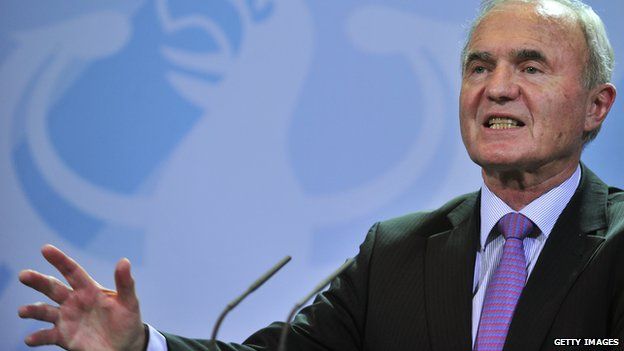What next for Greece?
- 30 April 2015
- Business

It's crunch time for Greece. Again.
A series of deadlines are looming that could trigger the country's exit from the euro - with all the political and financial upheaval that would entail.
Or we may see a political rapprochement, longed-for respite from austerity for the Greeks, and a slow return to economic stability and growth.
What's it to be?
We asked a range of experts for their views on what could, and should, happen next for Greece.
Greece in numbers
€320bn
Greece's debt mountain
€240bn
European bailout
- €56bn Greece owes Germany
- 177% country's debt-to-GDP ratio
- 25% fall in GDP since 2010
- 26% Greek unemployment rate
Reuters

Professor Otmar Issing
President, Centre for Financial Studies at Goethe University Frankfurt; former chief economist at the European Central Bank (ECB)

Prof Issing is hawkish on Greece's culpability and the need for Athens to learn to live within its means.
"There is no question that Greece is responsible herself for the mess she is in," he says. "It started with misguided policies even before the start and continued over many years."
Simply writing off Greece's debt would "immediately raise demands by other countries with high debt", he says, and would be especially difficult for the ECB and other debtors to swallow, given that banks and other private investors have already renounced "more than 50% of their claims - the largest debt relief in history."
Europe has done more than enough for Greece and a line must be drawn, he believes, even if this means it has to leave the euro.
While this would show that "the exchange rate regime is not irreversible", it would also "be a strong signal that a member country cannot continue endlessly violating rules and commitments."

Vicky Pryce
Chief economic adviser, Centre for Economics and Business Research; former joint head of the UK's government economic service

Vicky Pryce admits that that the negotiating stance of the Greeks has been "very aggressive", as the recent sidelining of finance minister Yanis Varoufakis in recent negotiations might suggest.
But she believes it is "ridiculous to assume that Greece will ever be able to pay its debt back in current conditions."
In her view, it is unfair to expect more structural reform and austerity "when the economy is collapsing around you. You can't have a country growing again if you've killed all entrepreneurial spirit."
She recommends a rather surprising course of action.
"My view is that the Greeks need to stop this liquidity crisis and promise anything - showing willingness is the most important thing - even if they then do nothing to fulfil those promises."
"The Greeks need to compromise even more, and so does Europe," she concludes.bbc

No comments:
Post a Comment